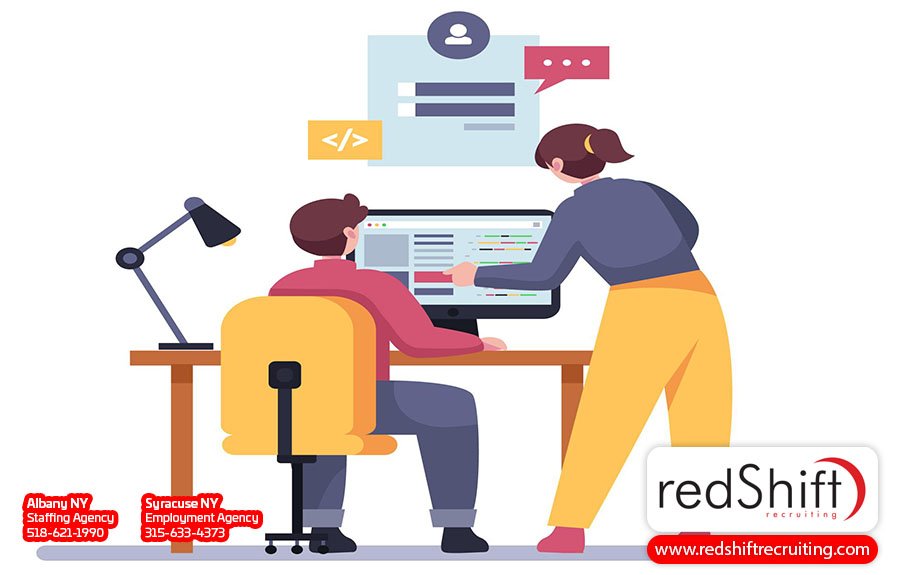The Top Qualities to Look for in a Front-End Developer
To thrive in the modern digital age, a strong online presence is a must-have for any business. An important element of this online footprint is creating a top-notch website or application that can attract customers and help build your brand. But to achieve this, you need a skilled front-end developer who can bring your vision to life.
So, what skills and characteristics should you look for when posting a front-end developer job and interviewing candidates? You want to hire someone who not only has the technical skills you need but also understands design principles and can collaborate seamlessly with backend developers and web designers to create exceptional user experiences. However, with the complexity of ever-changing web technologies and user experience expectations, finding the right front-end developer for your needs can be a daunting task.
In this article, we'll explore the top qualities to look for in a front-end developer, so you can screen candidates more effectively and identify the best candidate for the job. Whether you're a startup or a well-established business, these insights will help you identify the key traits that separate an average developer from an outstanding one.
What Is the Role of a Front-End Developer?
The front-end development process encompasses various aspects of creating web pages, from writing HTML, CSS, and JavaScript code to incorporating responsive design principles and utilizing modern JavaScript frameworks like React or Angular. Front-end developers play a crucial role in the web development process by creating visually appealing and user-friendly web pages. These professionals specialize in using hypertext markup language (HTML), cascading style sheets (CSS), and JavaScript to bring life to static designs and ensure optimal performance on modern web browsers.
Put simply, a front-end web developer is responsible for implementing all the visual and interactive elements that users see and interact with on a web page or application. They ensure a seamless user experience by optimizing website performance across multiple devices while adhering to current web standards. Front-end developers are an integral part of the web development process and work closely with back-end developers, who focus on server-side tasks.
Why Should You Hire a Front-End Developer?
We've all been there: clicking on a web page only to be greeted with a confusing layout, broken links, and a frustrating user experience. In today's digital age, a poorly designed website can damage a company's online presence and hinder its growth. That's why it's essential to hire a skilled front-end developer to create an attractive and easy-to-navigate website that will appeal to potential customers and build your brand's authority. With their expertise in cross-browser development, HTML, CSS, and JavaScript, they ensure seamless functionality across various devices and different browsers while keeping up with current design trends. With the right front-end developer on your team, you can improve web performance and ensure that your website or application is well-structured, visually appealing, and optimized for an outstanding user experience.
A skilled front-end developer goes beyond merely putting together aesthetically pleasing designs and ensuring the correct operation of your web pages; they also implement interactive features that enhance visitor engagement and encourage user interaction and conversion. By effectively utilizing browser developer tools, these experts fine-tune every detail on your site to create a responsive design that delivers a positive user experience that is both intuitive and satisfying.
Front-end developer skills are highly sought-after in today's market, and hiring the right developer can give your business a significant advantage over your competitors. With their creative problem solving and extensive knowledge of web design and testing processes, frontend developers can help move potential customers further down the sales funnel, keep them engaged on your site for longer, and ultimately increase conversions.
What Technical Skills Should You Look for in Front-End Developers?
Successful front-end development requires a combination of technical skills and soft skills. The most basic building block of front-end development is hypertext markup language (HTML), a standard markup language for web development and application development. Other basic skills for front-end development include proficiency in cascading style sheets (CSS) and a popular programming language such as JavaScript. Programming languages like HTML, CSS, and JavaScript form the backbone of any web interface, and a skilled front-end developer must have a solid understanding of these languages to create visually appealing and functional web designs and applications. Additionally, frontend developers should be familiar with version control and understand web performance optimization techniques such as image optimization.
A strong understanding of user experience (UX) and user interface (UI) design principles, as well as a good grasp of typography, color theory, and layout design, is required to create visually appealing and easy-to-use websites. Unit testing and functional testing are standard practices that a front-end developer should be familiar with, and it is essential to have experience with popular frameworks such as React, Angular, and Vue.js due to their widespread use in modern web development. These frameworks can make development work more efficient and help developers create complex web applications quickly. Proficiency in using command lines can also greatly improve efficiency when working on large-scale projects, while familiarity with tools like Git and IDEs will prove beneficial when collaborating within teams and managing versions of code.
Front-end developer skills should also include the ability to implement interactive features that enhance user engagement and create a seamless user interface experience. Effective use of browser developer tools and performance monitoring techniques will enable them to identify and resolve issues related to web performance, while knowledge of responsive typography, accessibility standards, SEO best practices, and web security principles is beneficial for creating high-quality and secure web designs. Additionally, familiarity with performance optimization techniques, responsive design principles, mobile-first development approaches, and cross-browser compatibility issues will be valuable to ensure web designs are optimized for various devices and web browsers.
Ultimately, the critical technical skills employers should look for in frontend developers include a solid understanding of HTML, CSS, and JavaScript, as well as version control, web performance optimization techniques, and familiarity with popular frameworks and tools. Finally, front-end developers should be comfortable with agile development methodologies and be able to use project management tools such as Jira or Trello to work collaboratively with cross-functional teams to deliver projects on time and within budget. A front-end developer with a well-rounded skill set and a passion for learning and innovation can be an invaluable addition to your organization.
What Soft Skills Should You Look for in a Front-End Developer?
While technical skills are vital for success in front-end development, don't underestimate the importance of soft skills. Soft skills can make or break a project and can be the difference between a good developer and a great one. Strong communication, collaboration, problem-solving, and adaptability skills are critical for front-end developers to work effectively with team members and clients, understand project requirements, and deliver high-quality products that meet or exceed expectations.
A front-end developer must possess excellent problem-solving skills and critical thinking capabilities since they'll be dealing with complex code structures and interactive elements every day. The ability to apply creative problem-solving skills during web design and the testing process is also essential. Having a detail-oriented nature will ensure high-quality output while minimizing errors in the development process. Teamwork is another vital skill for developers, as they need to collaborate closely with designers, back-end developers, and other stakeholders. Additionally, having excellent communication skills allows them to explain technical concepts effectively to non-technical colleagues or provide guidance and career support to junior team members. Finally, top front-end developers will be continuous learners who invest time in improving their front-end development skills and staying up-to-date on the latest trends in their field.
Front-end developer skills should include both strong technical abilities and good soft skills to ensure projects run smoothly and yield high-quality results. Conducting a job analysis will help you determine the top skills you need and allow you to set effective benchmarks that will help hiring managers screen candidates for these skills and identify the best fit for your team.
What Experience and Education Requirements Should You Have for a Front-End Developer?
Front-end web developers are responsible for creating and maintaining the visible site features that make your website engaging and user-friendly. A strong foundation in computer science is essential, and many top-quality front-end developers have degrees in fields such as computer science or software engineering. This educational background provides them with a solid understanding of core programming concepts and equips them to work effectively within front-end development environments.
However, a computer science degree alone doesn't guarantee success in this role. Practical, hands-on experience working on real projects is invaluable, and you should look for candidates who have honed their skills by building websites or applications using popular programming languages such as JavaScript, HTML5, or CSS3. Furthermore, familiarity with developer tools, such as version control systems (e.g., Git), and proficiency in multiple coding languages speak volumes about an applicant's adaptability and potential to excel in this role.
When evaluating a candidate's experience, keep in mind that the field of front-end development is constantly evolving. Look for candidates who stay up-to-date with the latest technologies and industry best practices and who actively seek out opportunities to expand their skillset.
While some employers may prefer candidates to have a certain number of years of experience in the field, keep in mind that this number doesn't necessarily correlate with a developer's ability to create high-quality, effective web experiences. Instead, focus on the candidate's practical experience and ability to demonstrate a strong understanding of front-end development principles. A well-rounded portfolio showcasing various types of projects will give you insight into how they approach problem-solving and whether their skillset aligns with your organization's needs.
Ultimately, a top front-end developer will have a balance of technical skills, practical experience, and up-to-date knowledge of the latest trends and technologies. With the right education, experience, and skills, a front-end developer can create stunning and engaging web experiences that keep users coming back for more.
How Can an IT Staffing Agency Help You Find the Right Front-End Developer?
If you're looking to hire a front-end developer but don't have the time or resources to source and screen candidates, an IT staffing agency is an invaluable resource. These agencies specialize in finding and placing top-tier candidates, and they can leverage their extensive network and recruitment resources to find the best IT professionals. They'll work with you to understand your unique needs and the specific requirements for your open front-end developer position, as well as identify other technical skills that may be relevant to your project or organization.
In addition to finding the best candidates, an IT recruiter will also conduct initial screening and testing to identify talented professionals who not only have a solid foundation in computer science and the skills mentioned in your job description but who also align with your organization's culture and values and are a good fit for your team.
Furthermore, an IT staffing agency can save you time and money by managing the hiring process for you. They screen candidates, schedule interviews, and handle offer letter negotiations, freeing up your team to focus on other important tasks. By leveraging their resources, expertise, and candidate network, you can be confident that you're getting top talent that possesses the necessary technical and soft skills to excel in the role.
Frequently Asked Questions
How Do You Balance Technical and Soft Skills When Selecting a Front-End Developer?
When assessing front-end developers, it's essential to consider both technical and soft skills to ensure you choose a well-rounded and effective candidate. Technical abilities such as proficiency in coding languages and frameworks, understanding of web performance, and familiarity with developer tools are critical for success, but soft skills are also important, such as the ability to communicate effectively with team members, adapt to changes, and solve problems creatively.
A front-end developer who possesses both sets of skills can work well with team members, communicate effectively with clients, and deliver high-quality products that meet or exceed expectations. To balance technical and soft skills, consider including specific soft skill requirements in the job description and using behavioral interview questions to assess candidates' problem-solving, communication, and collaboration skills.
What Industry-Specific Skills or Knowledge Should Front-End Developers Possess?
When considering industry-specific skills or knowledge for a front-end developer, it's important to note that these professionals should have a good understanding of the particular domain they'll be working in. For example, in e-commerce, developers would benefit from having experience with payment gateways, shopping cart functionalities, and product catalog management systems. Meanwhile, in the healthcare sector, familiarity with medical terminologies, regulatory compliances like HIPAA (Health Insurance Portability and Accountability Act), and electronic health record (EHR) systems can give them an edge over other candidates.
Depending on the industry they work in, front-end developers may need to have knowledge of specific programming languages, such as PHP or Ruby on Rails. They may also need to have a good understanding of web performance optimization, accessibility standards, and search engine optimization (SEO) best practices. By possessing relevant industry expertise alongside their technical abilities, front-end developers can better adapt to specific challenges faced by businesses operating within niche markets.
Do Front-End Developers Need Experience With Emerging Technologies, and How Can They Demonstrate Proficiency?
It is quite important for a front-end developer to have experience with emerging technologies, such as virtual reality or progressive web apps, as it shows they are continuously learning and adapting to new advancements, making them an asset to any team.
They can demonstrate their proficiency in these areas by:
Providing examples of projects they've worked on that utilize these technologies
Contributing to open-source projects
Attending industry conferences or workshops
Obtaining relevant certifications
Showcasing their knowledge through blog posts or online forums
Staying updated with cutting-edge technologies helps developers stand out among their peers and adds value to potential employers looking for versatile team members.
How Can You Assess a Front-End Developer's Problem-Solving and Critical Thinking Abilities?
To assess problem-solving and critical thinking abilities, present front-end developers with real-world scenarios during the interview or with coding challenges related to your project. Encourage candidates to think out loud as they work through these problems, which will allow you to observe their thought processes and gauge how they approach complex situations. Additionally, asking open-ended questions can help reveal their ability to analyze information, consider multiple perspectives, and generate creative solutions. Other methods may include reviewing their portfolio or asking about their experience addressing technical challenges. Evaluating these skills during the interview is crucial for ensuring that the candidate can effectively address issues and adapt to new challenges in their role as a front-end developer.
Are There Any Certifications or Professional Development Courses to Help Front-End Developers Stay Up-to-Date in Their Field?
There are numerous certifications and professional development courses that can help a front-end developer stay up-to-date with the latest trends and best practices in their field. Some popular certifications include the Certified Web Professional - Web Developer certification from the International Webmasters Association (IWMA); the Microsoft Certified Professional Developer (MCPD): Web Developer 4 certification; and the Google Front-End Web Developer Certificate from Coursera.
In addition to certifications, there are many online courses and bootcamps available that can help front-end developers enhance their skills and stay current with industry trends. Platforms like Udemy, Coursera, and LinkedIn Learning offer a variety of courses covering topics such as responsive design, JavaScript frameworks, and user interface design. Additionally, attending conferences, participating in hackathons, and contributing to open-source projects are other ways for front-end developers to improve their skills and stay connected with their professional community.
By staying current on emerging technologies and techniques through continuous learning initiatives, developers can enhance their expertise and ensure they're prepared for any changes in current technologies and trends.
Conclusion
Hiring the right front-end developer is critical for building a high-performing and visually appealing website. To succeed in this role requires a combination of technical and soft skills, industry-specific knowledge, problem-solving abilities, and experience with emerging technologies. To identify the right candidate for your team, you will need to assess their skills by evaluating their educational background, practical experience, technical abilities, soft skills, and personal projects. Additionally, look for candidates who are committed to growing as professionals by staying up-to-date with new technologies, tools, and trends through continuous learning and participation in professional development courses and certifications. By prioritizing these factors during the hiring process, you can find a front-end developer who can deliver high-quality work, collaborate effectively with your team, and help your organization stay ahead of the competition.
Article Author:
Ashley Meyer
Digital Marketing Strategist
Albany, NY





